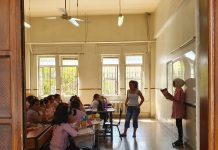SUMMARY OF INTERVIEW:
In what ways do sanctions impact on women and their families?
Dr Bouthaina explains that the sanctions against Syria are unilateral measures taken by the United States without UN approval or Security Council resolutions. “They were measures which were forced by the United States on Syria and forced on other countries to abide by….against any international law, any human law.”
She points out that they haven’t, of course, just affected women. “They’ve affected children; they’ve affected families; particularly the ill because they prevented, for example, medicine for cancer.” What’s more, sometimes hospitals don’t have oxygen or the sterilisers needed for surgeons to perform operations.
Furthermore, families can have problems accessing oil or gas in the winter when heating is sorely needed.
And, as Dr Bouthaina explains,
“it’s women who try to bridge the gap, and who try to create alternatives. So it really puts a huge burden on Syrian women…
“… without women you would not have the families together. Women are the ones who are taking care of the children, who have to feed them, who have to keep them warm; who have to look after their parents, not only after their children …
“…you go anywhere in Syria, and you find mostly women working in agriculture, working in industry, working in every domain. So these measures taken by the United States, if there were any law in the world, they would consider them criminal measures taken against innocent people …”
FURTHER INFORMATION ON SANCTIONS IMPOSED AGAINST SYRIA
Following America’s lead, Australia imposed sanctions on Syria in 2011. However, there is virtually no debate or discussion in Australia about the legality of the sanctions, the reasons behind them, or the impact they can have on the lives of ordinary Syrians.
Should we be concerned if Australia’s ‘autonomous sanctions’ purely reflect a short-sighted alignment with US foreign policy rather than a commitment to international law and humanitarian efforts to improve the living standards of Syrians who have suffered more than eight years of war?
References:
A. Australia’s ‘autonomous sanctions’ against Syria
According to Australian Government Department of Foreign Affairs and Trade (DFAT):
Since 2011, Australia has imposed autonomous sanctions in relation to Syria to reflect Australia’s grave concern at the Syrian regime’s deeply disturbing and unacceptable use of violence against its people. Australia also gives effect to United Nations Security Council (UNSC) Resolution 2199, which prohibits the trade in cultural property that has been illegally removed from Syria.
Q: What are ‘autonomous sanctions’?
Australia’s Department of Defence explains that Australia ‘imposes autonomous sanctions on certain countries and individuals to support our foreign policy objectives’.
B. United Nations Sanctions – UNSC Resolution 2199
UN media release:
Unlike Australia’s autonomous sanctions, Resolution 2199 is directed at preventing ‘terrorist groups in Iraq and Syria from benefiting from trade in oil, antiquities and hostages, and from receiving donations.’
Ironically, former CIA director David Petraeus advocated giving arms to Al-Nusra – once seen as the strongest Al-Qaeda affiliated fighting group in Syria.
C. UN expert says unilateral coercive measures exacerbate humanitarian crisis in Syria
17 May 2018
“I am deeply concerned in the way that sanctions are being implemented,” said Idriss Jazairy, the Special Rapporteur on the negative impact of the unilateral coercive measures on the enjoyment of human rights. “It is not allowing humanitarian actors to access the humanitarian exemptions that are an option under the unilateral coercive measures being applied to Syria.”
The Syrian people should not have to suffer for what has become an international conflict of unbelievable complexity. All those seeking to meet basic human rights require our help, not our red tape.”
“The ‘chilling effect’ resulting from over-compliance with sanctions is forcing humanitarian and economic actors to find irregular payment mechanisms which increase costs, add delays, decrease transparency and in some cases make it impossible for businesses to continue,” he said.
“The most urgent need in all sectors of Syrian society is for spare parts to keep everything from medical equipment; power and water supplies; tractors, ambulances, buses and factories functioning. The damage to the economy has a direct and indiscriminate human impact which particularly hurts the most vulnerable people.
“I also believe that all stakeholders in a position to deliver food, health, water and other human rights should be able to avail themselves of the humanitarian exemption to provide for the long-delayed realisation of human rights of the population. The experience I draw from this first visit to Syria leads me to be hopeful that there is a space for a dialogue on this matter,” the expert added.
D. Los Angeles Times, ‘For many Syrians, ‘smart’ sanctions are anything but’, by Nabih Bulos, 24 Dec 2018
Extracts from Bulos’s article:
At Mujtahed, one of the largest public hospitals in Damascus, supplies can take months to arrive and medical equipment costing hundreds of thousands of dollars sits unused for lack of replacement parts. Even the procurement of vital medicine can mean diving into a labyrinth of legal injunctions — with the health and, in some cases, the lives of patients at stake.
… The ongoing sanctions have affected everyone from doctors at Mujtahed to merchants, importers, industrialists and bankers across wide sectors of the nation’s battered economy.
But the problem, explained Salah Ismail, the doctor in charge of Mujtahed’s emergency care section, is that foreign suppliers often don’t dare send anything to Syria for fear of triggering unexpected violations — a real possibility.
…. international private companies are unwilling to jump the hurdles necessary to ensure they can transact with Syria without being accused of inadvertently violating the restrictive measures.”
Martin Luther King on War
“Beyond Vietnam”, 4 April 1967
In his landmark anti-war address ‘Beyond Vietnam’, Martin Luther King gave attention to the people of Vietnam, speaking not of “soldiers” or of “ideologies”, but of the people who were “living under the curse of war.…” He said there would be “no meaningful solution there until some attempt is made to know them and hear their broken cries.”
He quoted a Buddhist leader who wrote, ’the image of America will never again be the image of revolution, freedom, and democracy, but the image of violence and militarism.’
In his address, King declared, “The world now demands a maturity of America that we may not be able to achieve.
“If we do not act, we shall surely be dragged down the long, dark, and shameful corridors of time reserved for those who possess power without compassion, might without morality, and strength without sight.”
























